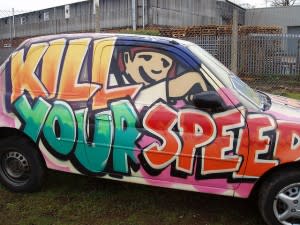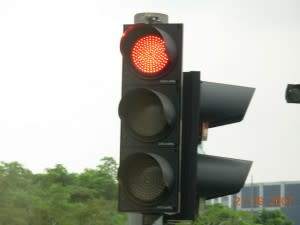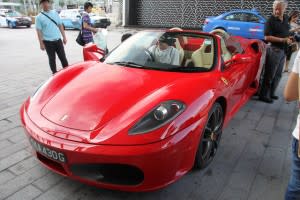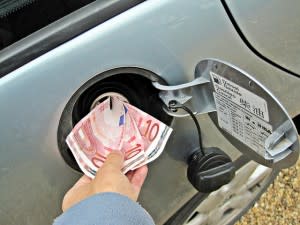8 Free Ways to Save on Petrol
This month, three things are going down faster than expected: America’s credit rating, Greek reserves, and the freaking needle on my fuel gauge. And in their breakneck race to hit “empty”, my petrol gauge is like Michael Schumacher on speed. But I asked around, and it turns out my petrol problem is preventable. I consulted an expert on fuel efficient driving:

Mr. Matthew Ong (HR Director for UPS)
Matthew Ong is the Director of Human Resources for UPS. Part of his job is making sure UPS drivers are trained in defensive driving. That means diving safely, and in a way that won’t relegate half their profits to Shell. I asked him for some practical tips:
1. Don’t Rev the Engine
In America, drivers like to do this to “warm up the engine” during winter. In Singapore, Ah Bengs like to do this because it’s the whole point of buying an Impreza. But it’s simple logic: revving the engine is burning petrol, without actually moving anywhere. It also wears the engine out.

You've heard of a chick magnet? Well this one's a cop magnet.
2. Don’t Leave it Idling
“At a traffic light there’s no choice,” Mr. Ong says, “but we tell our drivers not to leave the engine idling when they stop. They have to turn it off.”
The next time you’re stopping at a convenience store, and there’s a passenger in your car, wind down the window and turn off the engine instead. Besides burning fuel, idling means the water pump isn’t spinning at its most efficient speed. That will leave “hot spots” in your engine, which can cause mechanical failures.
3. Speed Control
I asked about speed control, which experts consider the biggest impact on fuel efficiency. Speed control means driving slowly to conserve fuel, yes? Apparently not:
“Every vehicle has an optimum speed. Going over the optimum speed burns more fuel, and going under it also burns more fuel.”
Mr. Ong explained that regardless of how slow you drive, a minimum amount of fuel is required to move the pistons and cylinders. Going slower can mean burning less fuel, but there’s an absolute minimum that’s consumed. Between travelling at 10 km/h and 12 km/h for example, you’d burn about the same amount. That makes travelling at 12 km/h (faster) more efficient, since it covers more distance with about the same amount of fuel.

Yes, great community spirit and message. Now please back off the pedestrian under your car.
The “sweet spot” for most vehicles is between 80 – 90 km/h, but this varies based on the vehicle.
4. Avoid Starts and Stops
“We train our drivers to time the (traffic) lights,” Mr. Ong says, “because the process of accelerating, of going from stationary to mobile, burns a lot of fuel. To avoid starts and stops, we train our drivers to vary their speed based on the upcoming lights. The idea is to travel through as many lights as possible, legally, without stopping.”
Come on. How many lights can you possibly avoid by…
“Some of our drivers can go through seven or more lights without stopping.”
Oh.
“New drivers usually get caught at the third or fifth light,” Mr. Ong says, “but with practice they usually get better.”
I asked for a beginner’s guideline:
“When approaching a light, don’t run the engine at maximum torque,” Mr. Ong says, “you might be stopping anyway. You also have to time when to start slowing down. If it’s red, slow down a good distance before you get there, so it’s green when you reach. It takes practice but if you keep doing it you’ll get better.”

If you're rich and own a Ferrari, that means "Go, and go really fast."
5. Don’t Jack-Rabbit
Jack-rabbiting should be avoided at all costs. It involves overtaking whenever possible, and switching lanes repeatedly to get killed ahead. Jack-rabbiting guzzles petrol faster than a Top Gear episode, and is the preferred way to get a tire iron in the face. Mr. Ong adds that:
“If you jack-rabbit and you hit the red light, you have to stop anyway. It makes no difference, you won’t get there faster. And you’re wasting fuel: every time your vehicle has to accelerate, it’s burning more fuel than when it’s cruising.”

Sir, get out of the car. We're going to beat you up for jack-rabbiting…in advance.
6. Maintain Your Engine and Tyres
Preventative maintenance can cut petrol costs by as much as 30 percent, over a year. According to Mr. Ong, one of the biggest impacts comes from the tyres:
“Running on low pressure tyres burns more fuel. When the tyre pressure is too low, the tyre will bite into the ground. This creates traction; the more traction you have, the more petrol you burn. You can check the PSI, or sometimes you can see that the tyre wall is visibly bulging.”
Keeping the engine in good condition is vital. Leaking engines, or engines with worn cylinders, need to work twice as hard to generate the same amount of power. That translates to burning more fuel.
7. Monitor Your Fuel Efficiency
Some cars (like Mercedes models) have built in fuel efficiency meters. Scroll through the menu on your dashboard, you may have one. Otherwise, you can do it manually:
Get a full tank (do this when you next refuel).
Make a note of the odometer reading.
Use your car as usual. The next time you need to refuel, check the new odometer reading.
Deduct the new odometer reading from the previous; that’s the distance you’ve travelled.
Check the amount of petrol you need to buy. This is also the amount of petrol you’ve used up.
Your average fuel consumption is (distance travelled) / (petrol used)

Our new model accepts 7 kinds of currency, or you can feed dead sea life directly into it.
Mr. Ong mentions that:
“Fuel efficiency varies based on the age, model, and make of the vehicle; but a good fuel efficient factor is 12 or 13 kilometres per litre. This is a standard for our drivers, but most car owners are around the 10 kilometres per litre mark. If it’s less than 10, it’s guzzling fuel.”
8. Go Manual, and Don’t Skip First Gear
I opened the age old question of manual vs. automatic. Mr Ong’s opinion was:
“Manual control can potentially use less fuel than an automatic; with manual a driver has more control over the acceleration. But it depends on the driver’s proficiency. An unskilled driver might end up burning more fuel, especially if they’re always playing with the brakes and clutch.
One thing a lot of van drivers do is to skip first gear. They go straight into second, because they don’t like the grinding sound. But second gear hasn’t got the same kind of power; the acceleration will burn more fuel.”

For you Ryan, those numbers match the number of people you'll potentially kill at that speed.
Conclusion
Monitoring fuel efficiency seems like it would be a real pain. So it’s a good thing I have a Merc on hand (go Mercedes!) The other methods are simple and straightforward, and they cost nothing. Make them a habit, and pretty soon slippery oil execs will be bribing me to shut up.
*On phone* What’s that OPEC? Italian bonds? I’m RICH!
Image Credits:
SFB579, amandabhslater, Zimit, Yutaka Tsutano, TaxBrackets.org, Chris Down UK
Do you have any fuel saving tactics to share? Comment and let us know! Digg Digg
Get more Personal Finance tips and tricks on www.MoneySmart.sg
Click to Compare Singapore Home Loans, Car Insurance and Credit Cards on our other sites.
More From MoneySmart

 Yahoo Finance
Yahoo Finance 